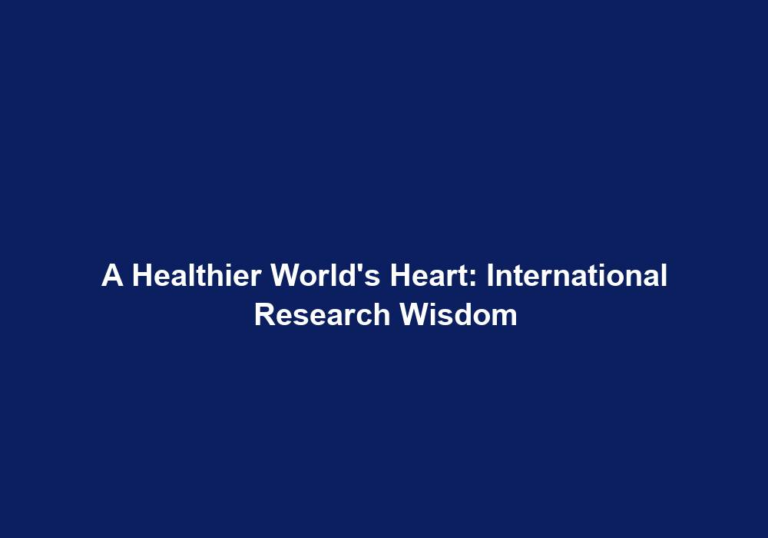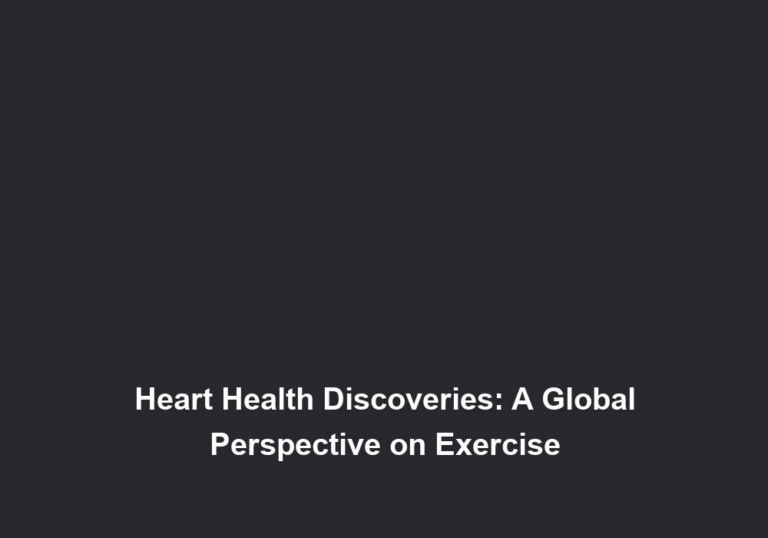Routine Health Check-ups: Your Heart’s Best Friend
Routine health check-ups are an essential part of maintaining a healthy lifestyle and ensuring the well-being of our body. Among various organs, our heart plays a vital role in keeping us alive and functioning correctly. Therefore, it is crucial to prioritize regular check-ups to monitor and maintain the health of our hearts. In this article, we will explore the importance of routine health check-ups and how they can be your heart’s best friend.
Why are routine health check-ups important for your heart?
- Early detection of heart diseases: Regular health check-ups can help in the early identification of potential heart problems. By detecting issues at an early stage, it becomes easier to manage and treat them effectively. Heart diseases, such as hypertension, coronary artery disease, and arrhythmias, can be detected through routine check-ups, allowing for timely intervention.
Early detection of heart diseases is crucial because it enables healthcare professionals to implement appropriate measures to prevent the progression of these conditions. For example, if hypertension is detected early, lifestyle modifications and medication can be prescribed to control blood pressure levels and reduce the risk of complications such as heart attacks and strokes. Similarly, routine check-ups can identify signs of coronary artery disease, such as chest pain or shortness of breath, prompting further diagnostic tests and interventions.
- Monitoring of risk factors: Routine check-ups enable healthcare professionals to assess and monitor the risk factors associated with heart diseases. Factors like high blood pressure, high cholesterol levels, obesity, tobacco use, and diabetes can increase the likelihood of heart-related issues. Through regular check-ups, these risk factors can be identified, and appropriate measures can be taken to minimize their impact on your heart health.
Monitoring risk factors is essential because it allows individuals to take proactive steps to reduce their risk of developing heart diseases. For example, if high blood pressure is identified during a routine check-up, lifestyle modifications, such as adopting a low-sodium diet and increasing physical activity, can be recommended to help manage blood pressure levels. Similarly, routine check-ups can identify high cholesterol levels, prompting dietary changes and, if necessary, medication to control cholesterol and reduce the risk of atherosclerosis and heart attacks.
- Evaluation of heart health: Regular check-ups include tests and examinations specifically designed to evaluate the overall health of your heart. These evaluations often involve assessing your blood pressure, cholesterol levels, body mass index (BMI), and conducting electrocardiograms (ECGs) to measure heart activity. These tests provide valuable insights into your heart’s condition and help in identifying any abnormalities or potential issues.
Evaluation of heart health through routine check-ups allows healthcare professionals to assess the functioning of the heart and detect any underlying conditions that may require further investigation or treatment. For instance, measuring blood pressure during a check-up helps determine if it falls within the normal range or if hypertension is present. Abnormal blood pressure readings may indicate the need for additional tests, such as 24-hour ambulatory blood pressure monitoring, to better understand blood pressure patterns and guide treatment decisions.
- Prevention of heart diseases: Prevention is always better than cure when it comes to heart diseases. Routine check-ups play a crucial role in preventing heart problems by identifying risk factors, providing appropriate counseling on lifestyle modifications, and offering necessary interventions. By adopting a proactive approach, you can minimize the chances of developing heart diseases and lead a healthier life.
Preventing heart diseases starts with identifying and addressing modifiable risk factors. Routine check-ups provide an opportunity for healthcare professionals to educate individuals about lifestyle changes that can significantly reduce the risk of heart diseases. For example, if a routine check-up reveals obesity as a risk factor, healthcare providers can offer guidance on healthy eating, physical activity, and weight management strategies. Moreover, routine check-ups allow for the early identification of pre-existing conditions, such as diabetes, which can be effectively managed to prevent cardiovascular complications.
Components of a routine heart health check-up
A comprehensive heart health check-up usually consists of the following components:
- Medical history review: Your healthcare provider will review your medical history, including any previous heart-related issues, family history of heart diseases, and current medication usage. This information helps in assessing your risk factors and developing a personalized approach to your heart health.
Reviewing your medical history is crucial as it provides valuable insights into your cardiovascular health. By understanding your past medical conditions, family history, and medication usage, healthcare professionals can better assess your risk of developing heart diseases. This information also helps in tailoring preventive strategies and treatment plans to suit your specific needs.
- Physical examination: A thorough physical examination is conducted to assess your general health. This may include measuring your blood pressure, checking for any signs of heart murmurs or irregular heartbeats, and evaluating your overall physical fitness.
A physical examination is an important part of a routine heart health check-up, as it allows healthcare professionals to assess your overall cardiovascular health. Measuring blood pressure helps identify hypertension, a major risk factor for heart diseases. Checking for heart murmurs or irregular heartbeats can indicate underlying heart conditions that require further investigation. Additionally, evaluating physical fitness through measures like body mass index (BMI) provides insights into your overall health and helps identify areas for improvement.
- Blood tests: Blood tests are conducted to measure various parameters that can indicate your heart’s health. These may include cholesterol levels, triglyceride levels, blood sugar levels, and inflammation markers. Abnormalities in these parameters can indicate an increased risk of heart diseases.
Blood tests are essential in assessing cardiovascular health as they provide valuable information about key risk factors and indicators of heart diseases. Measuring cholesterol levels, including LDL cholesterol (bad cholesterol) and HDL cholesterol (good cholesterol), helps evaluate the risk of atherosclerosis and cardiovascular events. Elevated blood sugar levels may indicate diabetes, a condition that significantly increases the risk of heart diseases. Additionally, inflammation markers, such as C-reactive protein (CRP), can help identify underlying inflammation, which is associated with an increased risk of heart diseases.
- Electrocardiogram (ECG): An ECG is a non-invasive test that measures the electrical activity of your heart. It helps in diagnosing irregular heart rhythms, identifying previous heart attacks, and assessing overall heart function.
An electrocardiogram (ECG) is a valuable tool in assessing the electrical activity of the heart and diagnosing various heart conditions. By recording the electrical signals produced by the heart, an ECG can detect irregular heart rhythms, such as atrial fibrillation or ventricular tachycardia. It can also identify previous heart attacks by showing characteristic changes in the ECG pattern. Additionally, an ECG provides insights into overall heart function, helping healthcare professionals assess the efficiency of the heart’s electrical conduction system.
- Echocardiogram: An echocardiogram is a type of ultrasound test that provides detailed images of your heart’s structure and function. It helps in assessing the pumping capacity of your heart, identifying any abnormalities in the heart valves, and detecting potential heart diseases.
An echocardiogram is a valuable diagnostic tool that allows healthcare professionals to visualize the heart’s structure and function in detail. By using high-frequency sound waves, an echocardiogram provides real-time images of the heart, enabling the assessment of the heart’s pumping capacity. It can identify abnormalities in the heart valves, such as stenosis or regurgitation, which can affect blood flow and lead to heart diseases. Moreover, an echocardiogram can detect potential heart diseases, such as cardiomyopathy or congenital heart defects, by visualizing the heart’s chambers and assessing their size and function.
- Stress test: A stress test is performed to evaluate your heart’s response to physical activity. It involves exercising on a treadmill or stationary bike while monitoring your heart’s activity through ECG and blood pressure measurements. This test helps in detecting any underlying heart problems that may not be apparent at rest.
A stress test, also known as an exercise stress test or treadmill test, is a valuable tool in assessing the heart’s response to physical activity. By monitoring the heart’s activity during exercise, healthcare professionals can detect any underlying heart problems that may not be apparent at rest. The test involves gradually increasing the intensity of exercise while monitoring the heart’s electrical signals through ECG and measuring blood pressure. Abnormal changes in the ECG pattern or blood pressure during the stress test may indicate reduced blood flow to the heart, suggesting the presence of coronary artery disease or other heart conditions.
How often should you have a routine heart health check-up?
The frequency of routine heart health check-ups may vary depending on various factors, including age, gender, medical history, and existing risk factors. Generally, it is recommended to have a routine heart health check-up every 1-2 years for individuals aged 20 and above with no significant risk factors.
However, if you have pre-existing heart conditions, a family history of heart diseases, or other risk factors, your healthcare provider may advise more frequent check-ups and monitoring. It is important to discuss your specific situation with a healthcare professional to determine the ideal frequency of check-ups for you.
Regular check-ups are essential for individuals of all ages, as they help in the early detection of potential heart problems and the implementation of preventive measures. By monitoring your heart health regularly, you can take proactive steps to reduce your risk of heart diseases and ensure the well-being of your cardiovascular system.
Lifestyle changes to support heart health
Routine check-ups are essential, but maintaining a heart-healthy lifestyle is equally crucial for overall well-being. Here are some lifestyle changes that can support your heart health:
- Eating a balanced diet: Include a variety of fruits, vegetables, whole grains, lean proteins, and healthy fats in your diet. Limit the intake of processed foods, saturated fats, trans fats, and excessive sodium.
A balanced diet is a cornerstone of heart-healthy living. Consuming a variety of nutrient-rich foods ensures that your body receives essential vitamins, minerals, and antioxidants that support heart health. Fruits and vegetables provide important dietary fiber and antioxidants that help reduce the risk of heart diseases. Whole grains, such as brown rice and whole wheat bread, are rich in fiber and can help lower cholesterol levels. Lean proteins, such as poultry, fish, and legumes, provide essential amino acids without the saturated fat found in red meat. Healthy fats, like those found in avocados, nuts, and olive oil, can help improve cholesterol levels. Limiting the intake of processed foods, saturated fats, trans fats, and excessive sodium is also important for heart health, as these dietary components are associated with an increased risk of heart diseases.
- Regular physical activity: Engage in regular exercise to keep your heart muscles strong and improve cardiovascular health. Aim for at least 150 minutes of moderate-intensity aerobic activity or 75 minutes of vigorous-intensity aerobic activity per week.
Regular physical activity is vital for maintaining a healthy heart. Engaging in aerobic exercise, such as brisk walking, jogging, swimming, or cycling, helps strengthen the heart muscles and improves cardiovascular fitness. Aim for at least 150 minutes of moderate-intensity aerobic activity or 75 minutes of vigorous-intensity aerobic activity per week to reap the benefits of exercise on heart health. Additionally, incorporating strength training exercises, such as lifting weights or doing bodyweight exercises, can help improve overall muscle strength and support heart health. Remember to consult with a healthcare professional before starting any exercise program, especially if you have pre-existing heart conditions or other medical concerns.
- Maintaining a healthy weight: Obesity and excess weight can put strain on your heart. Strive to maintain a healthy weight through a combination of a balanced diet and regular exercise.
Maintaining a healthy weight is crucial for heart health. Excess weight, especially around the abdomen, can increase the risk of heart diseases, including high blood pressure, high cholesterol levels, and diabetes. Strive to achieve and maintain a healthy weight through a combination of a balanced diet and regular physical activity. By following a balanced diet and engaging in regular exercise, you can create a calorie deficit that promotes weight loss or weight maintenance. Remember that weight loss should be gradual and sustainable, aiming for a loss of 1-2 pounds per week. Consult with a healthcare professional or a registered dietitian for personalized guidance and support in achieving your weight management goals.
- Avoiding tobacco and excessive alcohol: Smoking and excessive alcohol consumption are detrimental to heart health. Quit smoking if you are a smoker and limit alcohol intake to moderate levels, as recommended by healthcare professionals.
Tobacco use and excessive alcohol consumption have significant negative effects on heart health. Smoking tobacco damages blood vessels, reduces oxygen supply to the heart, and increases the risk of heart diseases, including coronary artery disease and heart attacks. Quitting smoking is one of the most important steps you can take to protect your heart. Seek support from healthcare professionals, use nicotine replacement therapies, and explore behavioral interventions to







